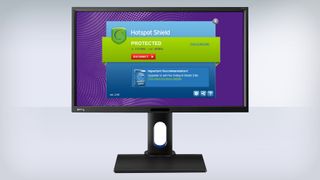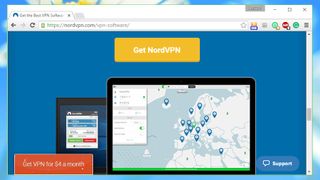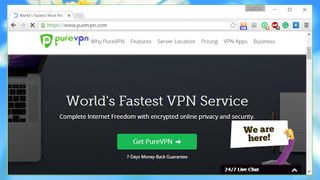How to set up a VPN
A VPN or Virtual Private Network is a secure method of connecting a remote computer or other devices to a server.
With a VPN you can unblock almost any website that limits access based on IP address, and bypass filters to reach your favourite sites any time you want. This makes it ideal for restricted public Wi-Fi hotspots, or watching Let’s Play videos on YouTube at work (although don’t tell your boss it was our idea).
In this guide we'll first show you the best VPNs for your needs, then how to set them up and keep them working well.
The best budget VPN

Hotspot Shield
Best for a budget
Low price
Great download speeds
Few server locations
Limited configuration options
This VPN service offers a choice of 20 locations including the US, UK, Australia, China, Hong Kong, India, Russia, Turkey and Mexico, and supports up to five device
If you're looking for a VPN that offers fantastic value for money, then AchorFree's Hotspot Shield is a great choice. You can pay annually for $25 (£20, AU$33), or for a one-off fee of $84 (£65, AU$120).
Privacy-wise this VPN will hide your IP address and DNS, keeping your identity completely safe.
The VPN service offers a choice of 20 locations including the US, UK, Australia, China, Hong Kong, India, Russia, Turkey and Mexico, and supports up to five devices.
There's also a free ad-supported version of the VPN as well.
Read the full review: Hotspot Shield
Best VPN for online security

NordVPN
Keep yourself secure online
Optional VPN over Tor
Up to 6 devices
Can't connect multiple devices to same server with same protocol
NordVPN
is a fantastic VPN service that features 685 servers in 52 countries,
2048-bit encryption, 6-device support as standard, strong DNS leak
protection, automatic Kill Switch, handy security extras, optional
dedicated IP addresses, and payment options including Bitcoin, PayPal
and credit cards.This means you can be pretty confident that your identity is protected when online. Best of all, these security measures don't impact your internet speed too much either.
Read the full review: NordVPN
Best VPN for internet speed

PureVPN
Boost your internet speed
Huge choice of servers
Two-year plan
No free trial
Failed DNS leak check
Using a VPN impacts your internet speed, as you're routing your connection via another server, but that doesn't always have to be the case.
Using the PureVPN service only increased latency in our tests by 5%, while upload speeds increased and downloads were boosted by an impressive 80%.
Read the full review: PureVPN
VPN checklist
From a simple browser-based VPN that uses SSL, to more complex systems, there is a VPN for every need. Use this checklist to help guide your decision-making:1. Perform a data audit to assess the VPN features that are needed
It is important to understand who will connect together using a VPN, and what kind of data they will exchange. This will guide your business to the right VPN protocol to use.
2. What kind of internet connection does your business have at the moment?
VPNs can easily use large quantities of bandwidth, so ensure your business connection can cope with this additional traffic. And don't forget you'll need static IP addresses to avoid the need to set up a new VPN each time a connection is required.
3. The maintenance of a VPN is vital to ensure it stays secure
It is essential to focus on the security aspects of the VPN connection. As a VPN could be in front of or behind a firewall, its security is of paramount importance. Antivirus software should be in place and up-to-date.
4. How to use public Wi-Fi and VPNs
If your business just wants to securely connect its workforce together when they are using public Wi-Fi, this is possible with a number of applications including HotSpot VPN and WiTopia.
5. Ensure that any VPN client is secure
A VPN will use its own client to make the connection to another device or server. The user ID and password will be stored on these devices, which of course could be stolen. Use a personal firewall, or a password on the computer's BIOS to prevent unauthorised personnel using the VPN client if the device was stolen.
Steve Roberts, service development manager at business communications provider Vtesse Networks, advises: "When setting up a VPN, organisations must ensure that their provider meets basic security standards such as ISO 27001, which may be required for governance purposes and data protection obligations.
"This is certainly true for PCI certifications too. If the organisation is handling credit card information, it can't afford to fall short when it comes to meeting these regulations."
As with all services you buy for your business, not all VPNs are the same. It is important to spend some time choosing the right VPN, as your business will rely on its efficiency as well as its data encryption ability on a daily basis.
Using a VPN allows two computers to make a secure connection to each other. The connection uses special protocols to establish a temporary bridge between the two machines. The data that travels over the bridge is encrypted.
The address of the recipient is in view so the data can be delivered, but the content of the message is completely hidden during transmission over the VPN. Businesses often also use VPNs to connect servers located in different offices giving employees seamless – and of course secure – access to the files and other assets (such as printers) they need to use.
Network protocol
Before setting up a VPN, the type of network protocol has to be chosen. There are four to consider:SSL (Secure Socket Layer)
This protocol will be familiar if you shop online or do online banking. SSL is the encryption that these services use. For very small businesses, SSL is ideal as the VPN is set up via an internet browser.
Open VPN
If cost is an issue, this VPN is based on open source SSL code but as its name suggests, the code can be seen – and potentially hacked – by anyone.
PPTP (Point-to-Point Tunnelling Protocol)
This is the latest type of VPN. It is supported natively by Windows, Mac OS X and mobile operating systems, which makes it ideal in the brave new world of BOYD and WYOD where personal devices need to be secured.
IPsec (Internet Protocol Security) and L2TP (Layer 2 Tunnelling Protocol)
These VPNs are inherently more secure than PPTP, for instance, but are more complex to set up.

And if you choose to use the PPTP protocol, you must ensure the network router is set to forward VPN traffic. There should be instructions on how to do this in the router's manual.
Also, for a VPN to operate effectively, static IP addresses must be used. Some businesses will use dynamic internet connections, which means a new VPN has to be established each time any computers or other devices want to make a secure VPN connection. This isn't ideal and certainly not very efficient for employees working away from their main offices, where they can obtain IT support.
Check the SLA
There are a number of VPN services to choose from. Many of these are free at least for their basic features, which in many cases will suffice for small business needs. However, pay close attention to the SLA (Service Level Agreement) that is attached to these services. Often you will be giving your agreement to see adverts and other annoying content.As Steve Roberts explained to TechRadar: "The multitude of service providers can be confusing so defining your business requirements beforehand helps to narrow down this list. It will also ensure the business gets the SLA they want, with the right availability, repair time and performance guarantees.
"Some of the providers which lead on price alone offer little more than consumer/residential broadband services – this is probably not suitable for organisations looking for a more robust VPN service."
Leading VPN suppliers include:
- Private Internet Access
- Hotspot Shield Elite
- ProXPN
- CyberGhost
- HideMyAss
- F-Secure Freedome
- NetMotion Wireless
- TorGuard
- Private Tunnel
- NordVPN
SOURCE: TECHRADAR.COM
How to set up a VPN
![How to set up a VPN]() Reviewed by mosjoe
on
05:24
Rating:
Reviewed by mosjoe
on
05:24
Rating:

Consummate case of hypothesis, compassion and expression. Here I took in another approach to theorize through writer's written work. It enabled me to feel another approach to estimate your considerations and express them in a simple and clear way. Professional web design services
ReplyDeleteThanks for sharing your knowledge to install & crack the Time Tables, but you need to update it now. because there is a 2022 version available now.
ReplyDeletepurevpn-crack
novapdf-pro-crack
spotify-premium-crack
displayfusion-crack
god-of-war-4-crack
faststone-capture-crack
fitness-manager-crack
total-commander-crack
disk-drill-pro-crack
twinmotion-crack
This site have particular software articles which emits an impression of being a significant and significant for you individual, able software installation.This is the spot you can get helps for any software installation, usage and cracked.
ReplyDeletekickasscrack.com
hotspot-shield-vpn-crack
wondershare-uniconverter-crack-2
avast-driver-updater-crack
ReplyDeleteI thought this was a pretty interesting read when it comes to this topic. Thank you
driver-genius-pro-crack
actiondirector-video-editor-crack
facebook-social-toolkit-crack
cubase-pro-crack
adobe-dimension-cc-crack
fifa-mobile-soccer-mod-apk-crack
zemax-opticstudio-crack
proteus-pro-crack
system-mechanic-ultimate-defence-crack
This is a great piece of information, thanks for sharing. Just a question can you do the same for every service provider? I use Ivacy VPN can I follow these steps?
ReplyDelete